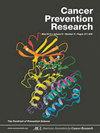饮食调节肠道微生物组、新陈代谢和乳腺炎症,从而影响乳腺癌风险
IF 2.6
3区 医学
Q2 ONCOLOGY
引用次数: 0
摘要
多项研究表明,肥胖与乳腺癌风险之间存在密切联系。肥胖降低了肠道微生物的生物多样性,并调节了类杆菌与固着菌的丰度比例,这表明从难以消化的膳食纤维中获取能量的能力增加以及脂多糖生物利用率的提高可能会促进炎症。针对将饮食介导的肠道微生物群变化与乳腺癌风险联系起来的有限证据,我们旨在确定饮食如何影响微生物群和乳腺癌风险。给 3 周大的雌性 BALB/c 小鼠喂食六种不同的饮食(对照组、高糖、猪油、椰子油、猪油+亚麻籽油和猪油+红花油),为期 10 周。每组都进行了粪便 16s 测序。饮食改变了粪便微生物组群并调节了乳腺巨噬细胞浸润。粪便条件培养基改变了巨噬细胞的极性和炎症。在我们的 DMBA 诱导的乳腺癌模型中,饮食对肿瘤和乳腺的新陈代谢起着不同的调节作用。我们展示了饮食模式如何改变代谢结果和肠道微生物群,这可能会导致乳腺肿瘤风险。此外,我们还展示了饮食对新陈代谢、炎症和巨噬细胞极性的影响。这项研究表明,饮食与微生物组之间的相互作用是乳腺癌风险的关键介质。本文章由计算机程序翻译,如有差异,请以英文原文为准。
Diet modulates the gut microbiome, metabolism, and mammary gland inflammation to influence breast cancer risk
Several studies have indicated a strong link between obesity and the risk of breast cancer. Obesity decreases gut microbial biodiversity and modulates Bacteroidetes-to-Firmicutes proportional abundance, suggesting that increased energy-harvesting capacity from indigestible dietary fibers and elevated lipopolysaccharide bioavailability may promote inflammation. To address the limited evidence linking diet-mediated changes in the gut microbiota to breast cancer risk, we aimed to determine how diet affects the microbiome and breast cancer risk. Female 3-week-old BALB/c mice were fed six different diets (control, high-sugar, lard, coconut oil, lard+flaxseed oil, and lard+safflower oil) for 10 weeks. Fecal 16s sequencing was performed for each group. Diet shifted fecal microbiome populations and modulated mammary gland macrophage infiltration. Fecal conditioned media shifted macrophage polarity and inflammation. In our DMBA-induced breast cancer model, diet differentially modulated tumor and mammary gland metabolism. We demonstrated how dietary patterns change metabolic outcomes, and gut microbiota, which may contribute to breast tumor risk. Furthermore, we showed the influence of diet on metabolism, inflammation, and macrophage polarity. This study suggests that dietary-microbiome interactions are key mediators of breast cancer risk.
求助全文
通过发布文献求助,成功后即可免费获取论文全文。
去求助
来源期刊

Cancer Prevention Research
医学-肿瘤学
CiteScore
6.00
自引率
3.00%
发文量
173
审稿时长
1 months
期刊介绍:
Cancer Prevention Research publishes original studies, reviews, and perspectives in the field of cancer prevention. Its scope includes the molecular and cellular biology of premalignancy and early lesions; genetic and environmental risk factors; risk assessment and reduction; early detection research (cancer screening and diagnosis); and preventive interventions (chemoprevention, immunoprevention, and others) to intercept cancer development at early stages prior to initiation, promotion, or progression. The journal comprises preclinical, clinical, and translational research, with special attention given to molecular discoveries and an emphasis on building a translational bridge between the basic and clinical sciences.
 求助内容:
求助内容: 应助结果提醒方式:
应助结果提醒方式:


